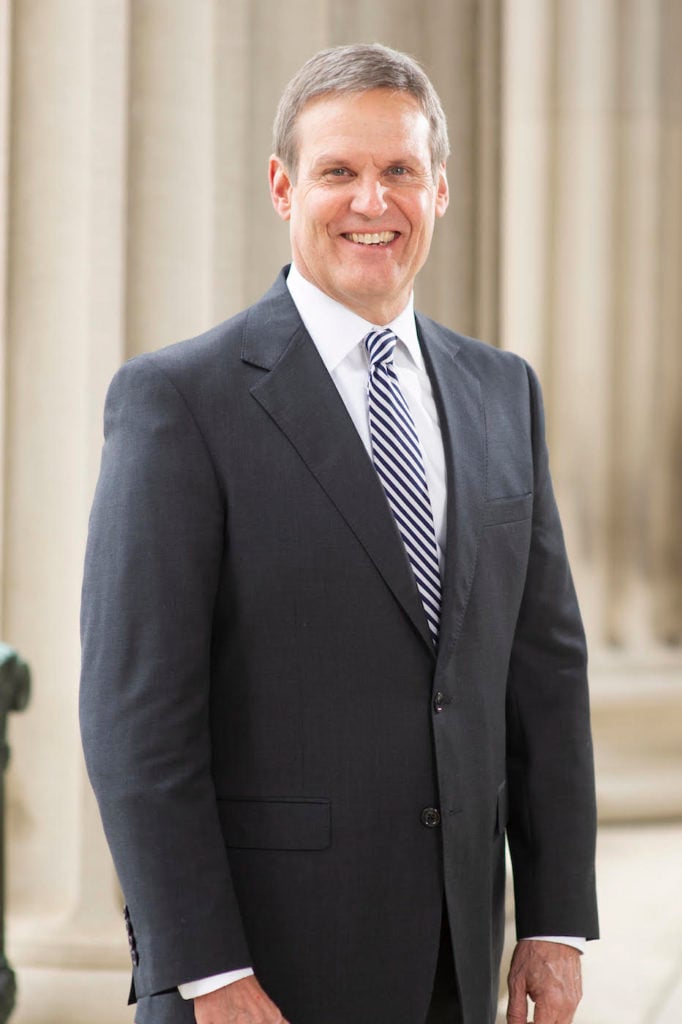
Tennessee’s Republican Gov. Bill Lee signed House Bill 1182 into law in May, which required any “building or facility open to the general public” that allows trans access to post a sign with this language: “This facility has a policy of allowing the use of restrooms by either biological sex, regardless of the designation on the restroom.” It applies to locker rooms, showers, and dressing rooms as well, and went into effect July 1. A federal judge blocked the bill on Friday. Photo: State of Tennessee.
One of the nation’s most insidious anti-LGBTQ+ laws, which required that Tennessee businesses post signs warning the public that they allow trans patrons to use their facilities, was blocked by a federal judge Friday.
Republican Gov. Bill Lee signed House Bill 1182 into law in May, which required any “building or facility open to the general public” that allows trans access to post a sign with this language: “This facility has a policy of allowing the use of restrooms by either biological sex, regardless of the designation on the restroom.” It applies to locker rooms, showers, and dressing rooms as well, and went into effect July 1.
Responding to a lawsuit by Kye Sayers and Bob Bernstein — who run an arts center in Chattanooga and a restaurant in Nashville, respectively — Judge Aleta A. Trauger of the U.S. District Court for the Middle District of Tennessee granted a preliminary injuction against the “trans signs” law while their court case against it proceeds.
51 years ago Lee Glaze fought police harassment & made gay history
In her decision on the injunction, Trauger wrote, “Restaurants and performing spaces are businesses, but that is not all they are; they are also among the most important physical locations in which communities — so often consigned, in this era, to electronic space — can gather and grow together in a manner rooted in a particular neighborhood, in a particular city, in a particular state. The plaintiffs have presented evidence that they have strived to be welcoming spaces for communities that include transgender individuals and that the signage required by the Act would disrupt the welcoming environments that they wish to provide. That harm would be real, and it is not a harm that could simply be remedied by some award at the end of litigation.”
LGBTQ+ activists heralded the decision.
“This law is bad for businesses in Tennessee, and most importantly, harmful to transgender people,” Hedy Weinberg, executive director of the American Civil Liberties Union of Tennessee, said in a statement. “We are glad the court saw that this law is likely unconstitutional and hope that the state gives up the wasteful effort to defend discrimination and a violation of the First Amendment.”
The plaintiffs also expressed jubilation.
“I am glad the court saw that forcing businesses to display a sign that hurts transgender and intersex people is unconstitutional,” said Sayers, one of the plaintiffs in case. “These signs would have damaged our businesses and the environment we have tried to create for our community, customers, and staff.”
“I’m happy that the court stopped this invasive and decisive legislation for now and am hopeful this leads to a permanent ban of an unconstitutional violation of my freedom of speech rights,” said Bernstein, owner of Fido restaurant in Nashville.
The trans signs bill is just part of Gov. Lee’s recent “slate of hate,” which includes restrictions on trans-inclusive health care and a law that bars trans students from using multi-occupancy school restrooms and changing rooms that align with their gender identity, instead forcing them to use single-occupancy or staff restrooms, and makes it grounds for a lawsuit if a cisgender student encounters a trans person in a multi-user facility. Another law bars trans students from the sports teams designated for their gender identity. Yet another requires schools to notify parents of lessons that include LGBTQ+ content and allow students to opt out of them.
This article originally appeared on Advocate.com, and is shared here as part of an LGBTQ+ community exchange between Q Voice News and Pride Media.
